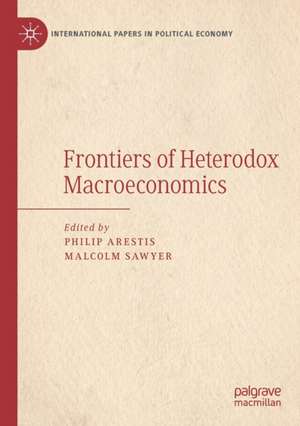Frontiers of Heterodox Macroeconomics: International Papers in Political Economy
Editat de Philip Arestis, Malcolm Sawyeren Limba Engleză Paperback – 20 sep 2020
| Toate formatele și edițiile | Preț | Express |
|---|---|---|
| Paperback (1) | 946.55 lei 43-57 zile | |
| Springer International Publishing – 20 sep 2020 | 946.55 lei 43-57 zile | |
| Hardback (1) | 957.75 lei 43-57 zile | |
| Springer International Publishing – 20 sep 2019 | 957.75 lei 43-57 zile |
Din seria International Papers in Political Economy
- 20%
 Preț: 939.65 lei
Preț: 939.65 lei - 15%
 Preț: 637.93 lei
Preț: 637.93 lei - 15%
 Preț: 640.37 lei
Preț: 640.37 lei - 15%
 Preț: 641.71 lei
Preț: 641.71 lei - 15%
 Preț: 640.06 lei
Preț: 640.06 lei - 15%
 Preț: 641.71 lei
Preț: 641.71 lei - 15%
 Preț: 644.95 lei
Preț: 644.95 lei -
 Preț: 391.61 lei
Preț: 391.61 lei -
 Preț: 393.52 lei
Preț: 393.52 lei -
 Preț: 393.13 lei
Preț: 393.13 lei - 15%
 Preț: 639.41 lei
Preț: 639.41 lei - 18%
 Preț: 903.93 lei
Preț: 903.93 lei -
 Preț: 392.60 lei
Preț: 392.60 lei - 18%
 Preț: 1011.27 lei
Preț: 1011.27 lei - 18%
 Preț: 957.62 lei
Preț: 957.62 lei - 18%
 Preț: 1112.48 lei
Preț: 1112.48 lei - 18%
 Preț: 1111.22 lei
Preț: 1111.22 lei - 15%
 Preț: 638.11 lei
Preț: 638.11 lei
Preț: 946.55 lei
Preț vechi: 1154.34 lei
-18% Nou
Puncte Express: 1420
Preț estimativ în valută:
181.18€ • 196.87$ • 152.29£
181.18€ • 196.87$ • 152.29£
Carte tipărită la comandă
Livrare economică 21 aprilie-05 mai
Preluare comenzi: 021 569.72.76
Specificații
ISBN-13: 9783030239312
ISBN-10: 3030239314
Pagini: 378
Ilustrații: XXII, 378 p. 15 illus., 8 illus. in color.
Dimensiuni: 148 x 210 mm
Greutate: 0.48 kg
Ediția:1st ed. 2019
Editura: Springer International Publishing
Colecția Palgrave Macmillan
Seria International Papers in Political Economy
Locul publicării:Cham, Switzerland
ISBN-10: 3030239314
Pagini: 378
Ilustrații: XXII, 378 p. 15 illus., 8 illus. in color.
Dimensiuni: 148 x 210 mm
Greutate: 0.48 kg
Ediția:1st ed. 2019
Editura: Springer International Publishing
Colecția Palgrave Macmillan
Seria International Papers in Political Economy
Locul publicării:Cham, Switzerland
Cuprins
1. Critique of the New Consensus Macroeconomics and a Proposal for a More Keynesian Macroeconomic Model- Philip Arestis.- 2. Approaching budget deficits, debts and money in a socially responsible manner- Malcolm Sawyer.- 3. Advances in the Post Keynesian Analysis of Money and Finance- Marc Lavoie.- 4. Why the Sub-Prime Financial Crash Should Have Been Prevented: Lessons for Future Macroeconomic and Regulatory Policy- John McCombie and Marta Spreafico.- 5. Inflation: Failures of Inflation Targeting- Elisabeth Springler.- 6. SFC Dynamic Models: Features, Limitations and Developments- Emilio Carnevali, Matteo Deleidi, Riccardo Pariboni and Marco Veronese Passarella.- 7. Fiscal policy and ecological sustainability: a post-Keynesian perspective- Maria Nicolaides and Yannis Dafermos.- 8. How secular stagnation can affect income class structure in European countries: institutional and policy implications- Salvador Perez-Moreno and Elena Bárcena-Martín.
Notă biografică
Philip Arestis is Professor and Director of Research at the Cambridge Centre for Economics and Public Policy, Department of Land Economy, University of Cambridge, UK, and Professor at the Department of Applied Economics, University of the Basque Country, Spain. He is also Adjunct Professor, University of Utah, USA, and Research Associate, Levy Economics Institute, New York, USA.
Malcolm Sawyer is Emeritus Professor of Economics, Leeds University Business School, University of Leeds, UK. He has been the principal investigator for the European Union funded (8 million euros) five year research project Financialisation, Economy, Society and Sustainable Development, involving 15 partner institutions across Europe and more widely.
Textul de pe ultima copertă
In the past few decades, and intensified since the global financial crisis of August 2007, heterodox macroeconomics has developed apace and its scope has broadened in a number of directions. The purpose of this volume is to review the ‘state of the art’ in heterodox macroeconomics, its strengths and weaknesses and future directions. Heterodox macroeconomics has broadened its scope through gender macroeconomics, ecological macroeconomics and further incorporated income distribution and inequality into macroeconomics analysis. New macroeconomic models, particularly stock-flow consistent modelling has become a widely used mode of analysis. Money and finance, monetary policy and fiscal policy as well as other policies have been discussed widely. The focus of this edited collection is on all of these issues, with chapters focusing on inflation, ecological sustainability and regulatory policy.
Caracteristici
Explores the development of sub-disciplines within heterodox economics whilst maintaining the focus on macroeconomics Considers how Hetrodox Economics has changed in a Post-Crash environment Brings together a range of highly respected contributors
